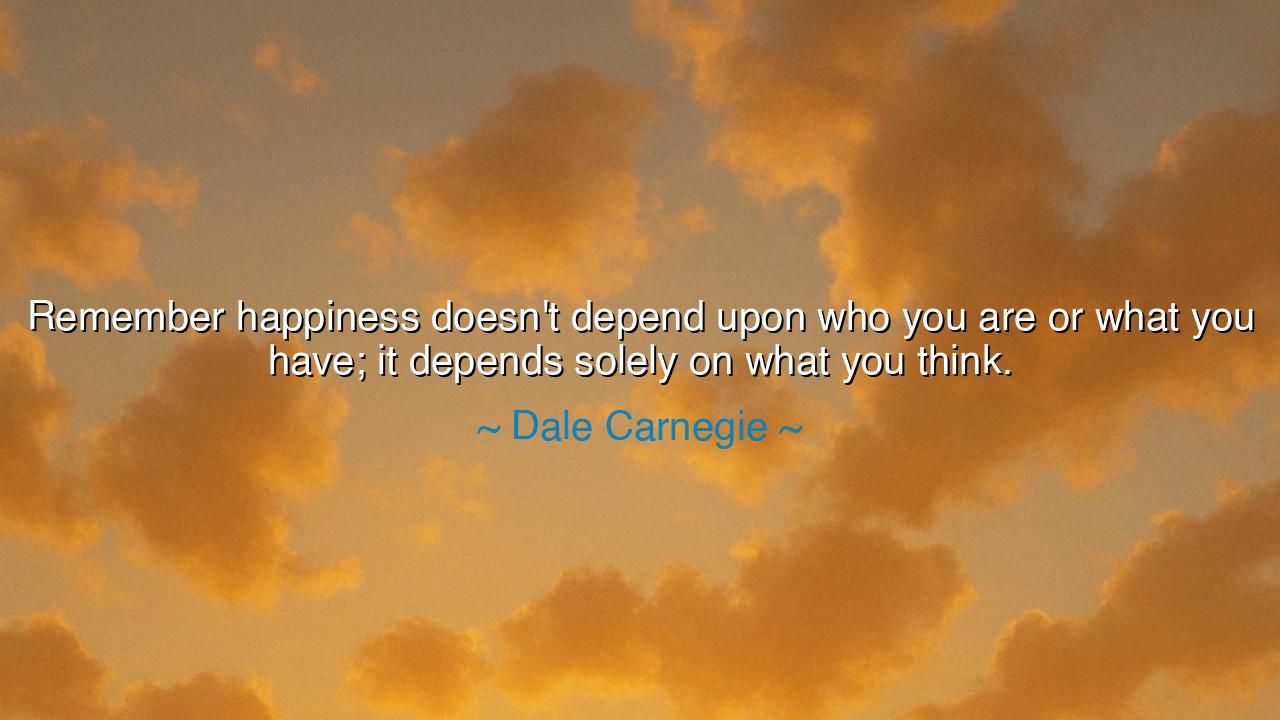
Remember happiness doesn't depend upon who you are or what you
Remember happiness doesn't depend upon who you are or what you have; it depends solely on what you think.






In the immortal words of Dale Carnegie, “Remember happiness doesn’t depend upon who you are or what you have; it depends solely on what you think,” there lies a timeless truth — that happiness is not a treasure buried in wealth, status, or circumstance, but a creation of the mind itself. These words rise like a clear bell through the fog of human longing, reminding us that joy is not bestowed from without, but cultivated from within. It is not the crown upon a king’s head that makes him content, nor the gold in his coffers that grants him peace, but the thoughts he holds in his heart — for a pauper with serenity in his mind is richer than a tyrant with fear in his soul.
The origin of this wisdom springs from Carnegie’s lifelong study of human nature. As a teacher, writer, and philosopher of success, Dale Carnegie sought to understand what made some people thrive amidst adversity while others withered under privilege. His teachings — from How to Win Friends and Influence People to How to Stop Worrying and Start Living — revolved around a single radiant idea: that our inner world shapes our outer one. By changing our thinking, we change our reality. He saw that happiness, like character or virtue, cannot be purchased, inherited, or granted by fate. It must be chosen — moment by moment, thought by thought.
This truth echoes through the ages. The Stoic philosopher Epictetus, born a slave in Rome, taught that men are disturbed not by things, but by the opinions they form of them. He lived in chains, yet his mind was free. He knew, as Carnegie would centuries later, that the key to happiness is the mastery of perception — the ability to direct thought toward gratitude and purpose rather than resentment and fear. “It depends solely on what you think,” says Carnegie, and in those words lies the same eternal flame that burned in the minds of Socrates, Seneca, and Marcus Aurelius: that the mind is the true citadel of human peace.
Consider the story of Viktor Frankl, a man imprisoned in the death camps of Nazi Germany. Stripped of everything — his home, his family, his freedom — he discovered a truth even darker walls could not contain: that though they could take away his body, they could not command his thoughts. In the depths of suffering, he wrote later, he found that “everything can be taken from a man but one thing: the last of the human freedoms — to choose one’s attitude.” His discovery was not far from Carnegie’s teaching. Both men, through their trials, declared the same law of the spirit: that the power of thought is greater than circumstance, and that happiness belongs to those who guard their minds.
Yet this teaching demands more than mere optimism — it demands discipline. To think rightly is a daily act of courage. The mind, untamed, runs toward fear, envy, and despair; it must be trained as one trains a horse — gently, patiently, yet firmly — until it learns to walk the path of peace. Happiness, as Carnegie reminds us, is not a gift that falls upon the idle. It is a craft, an art of self-command. To awaken each morning with gratitude, to meet failure with understanding, to turn complaint into compassion — these are the quiet triumphs of thought that transform an ordinary life into a noble one.
For the modern soul, surrounded by wealth yet burdened by comparison, Carnegie’s words are more vital than ever. We live in an age where what you have and who you appear to be are worshiped as the measures of worth. Yet history shows again and again that even the mightiest grow hollow when their minds are enslaved by dissatisfaction. The truly joyful are not those who possess the most, but those who perceive the most — who can find beauty in simplicity, meaning in labor, and peace in the stillness of a clear conscience.
Let this, then, be the lesson: if you would find happiness, cease searching for it in the world and begin cultivating it in your thoughts. When envy stirs, think gratitude. When fear arises, think courage. When doubt whispers, think faith. Guard your mind as a sacred garden, and the flowers of joy will bloom of their own accord. For as Carnegie teaches, it is not wealth or power that determines a person’s peace, but the thoughts they choose to dwell upon.
So remember, O seeker of serenity: the mind is both master and servant, builder and destroyer. Train it well, and it will build you a kingdom of peace no storm can shake. Forget it, and no fortress will protect you from misery. Happiness does not lie in who you are or what you have — it lies in what you think. And when you master that truth, you will find that joy is not a distant dream, but a companion already walking beside you, waiting to be seen.






AAdministratorAdministrator
Welcome, honored guests. Please leave a comment, we will respond soon